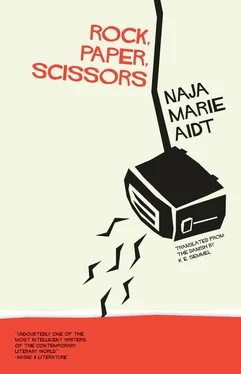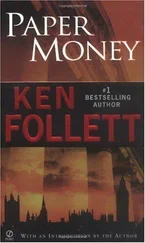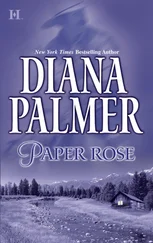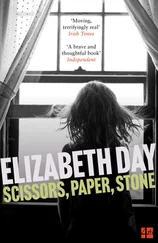Naja Marie Aidt
Rock, Paper, Scissors
And we, who have always thought of happiness rising, would feel the emotion that overwhelms us whenever a happy thing falls.
Rainer Maria Rilke, “The Tenth Elegy” (trans. by Stephen Mitchell)
Aman cuts across the street in the city center. It’s drizzling. The traffic is earsplitting and intense, from shouting to dogs barking, from roadwork to the wailing of ambulances and the cooing of doves, from children screaming in their strollers to the metro rumbling beneath the streets, from hyperactive teenagers to the muttering homeless, from buses to street hawkers. Thomas crosses the street, a thin leather portfolio tucked under one arm, an umbrella under the other, and on his heels a plump, blonde woman hustles to match his pace. When she’s almost at his side she clutches his jacket, her cotton coat flapping behind her like a tail or a kite, and glances about wildly. A car races toward them at high speed. She gasps and lunges ahead, and at last they’re safe on the sidewalk, and Jenny lets go of Thomas. She says, “Can’t you use the crosswalk like a normal person? You almost got me killed.” Her eyes are wide and bright.
“Have you been crying?”
“I wasn’t crying.”
“It looked like you were crying back there.”
“Maybe I was crying on the inside. I was dying of hunger.” She raises her chin defiantly and begins to walk. Thomas follows. They head down a side street, away from the noise, a long, narrow street, poorly lit. It’s 6:30 P.M. and darkness expands around them. The air is cool. A raindrop pelts Thomas’s cheek, and before long they’re seated opposite one other at a table in a small restaurant. Thomas’s eyes roam across the objects between them: a green ceramic bowl filled with olive oil, a breadbasket, salt and pepper shakers, a carafe of water, and two mismatched glasses. Jenny’s chubby white hand fidgets with a napkin. Then she leans back and looks at him. “What did you think about the lawyer? Should we hire him?”
“Do we have a choice?”
“I guess not. Why were you so late?”
“I don’t know. Maybe I was hesitant.”
“Hesitant? Why hesitant?”
He smiles at her and lights a cigarette. “Does it even matter now?”
“Do you have to smoke?”
“Yes.”
“Are you even allowed to smoke here?”
“Yes. What are you going to eat? You want a glass of wine?”
“I want a Bloody Mary. And pasta with pancetta. And a salad. Remember the olives we had the last time we were here? You think we can get them again?”
The waiter, a stooped older man with wavy black hair, takes their orders and disappears into the kitchen. When the door swings open, Thomas sees two young men, one hunched over some steaming pots, the other grappling with a frying pan. In the warmth of the kitchen, their faces gleam with sweat. But it’s cool in the high-ceilinged room they’re in. Thomas shivers. A middle-aged woman behind the bar polishes drinking glasses. The restaurant isn’t even half full. “Remember when Dad brought us here the night of the accident, after you’d been to the emergency room? We sat over there.” Jenny points at a table next to the window. “I think it must’ve been this same waiter, back when he was young. You were pale as a sheet. How old were we?”
“I was eleven, you were nine.”
“And we got to order whatever we wanted. All I ate was chocolate cake. Three slices.” She laughs suddenly and loudly. “Ha! You were pale as a sheet, though nothing had happened. Nothing serious. Bumps and bruises. Just a few bumps and bruises.”
The waiter sets steaming plates before them. The bartender places a red drink, a pallid stalk of celery poking out of it, in the middle of the table as if it were meant to be shared.
“Just a few bumps and bruises,” Thomas repeats slowly, pushing the drink toward Jenny. “That’s one way to look at it.”
“Oh, don’t be so dramatic. Eat your food. Cheers.”
She raises her Bloody Mary so that the lamplight shines through the red liquid. “Ha! Just a few bumps and bruises!”
“That actually looks like blood,” he says, pointing at the glass with his fork. Then he bores into his oxtail and shovels the sauce with his knife. The waiter limps back carrying a half-empty bottle of red wine along with a plate of olives. But Jenny isn’t happy. “They aren’t anything like the ones we had last time. Plain, tasteless. I bet they got them at the local supermarket. Try them yourself. Everything gets worse over time, everything, everything. Doesn’t it?” Thomas refuses to try the tasteless olives. He takes a swig of wine, and says: “Dear Jenny, you’re always complaining. Everything doesn’t get worse over time, everything gets better. We’re rid of Dad, for one thing. Think about that. And he’ll never come back. Except in our most terrifying nightmares.”
“How can you be so mean? You’ve always been mean. It’s a constant, neither worse nor better with time. But everything else gets worse. Love and marriage. Our bodies fall apart. Hideous! Things get uglier. Doors, buildings, chairs, cars. And silverware.” She pokes her fork at him. “Yup, even silverware gets uglier and uglier, and people get uglier and uglier. Just think of Helena and Kristin’s twins, how they dress so tastelessly you wonder if it’s a joke. They sent a photograph at Christmas, Kristin must have taken it — she’s such a terrible photographer — and. .” She stops abruptly, sets down her fork, and smoothes her shirtsleeves. Then she looks directly into his eyes. “You’re also getting uglier. You really are. You were handsome once. You looked like Mom and her brothers.”
“Can we talk about something a little more uplifting?” Thomas smiles at Jenny, but she shakes her head, and says: “I don’t know. I’m not doing so well. You think we can save a few odds and ends from Dad’s apartment before it’s cleaned out?”
“There’s nothing there, Jenny. Just a few ugly, ugly things.” He smiles again, and now she too smiles, despite herself. Her teeth are yellow, her mouth wide and red. A sudden gleam in her green eyes.
“I want the toaster. It’s special to me.”
“Then take it. No one will know. What do you want with an old toaster?”
“Come to think of it, did he have anything personal in his cell?”
Thomas lights another cigarette and shakes his head. The bartender’s playing some strange music, a kind of languid disco.
“A notebook and a stack of porn mags. His watch.”
“What was in the notebook?”
“Nothing. Doodles and some phone numbers.”
“He didn’t even have a photo of us?”
“Don’t be childish, Jenny. Of course he didn’t have a photo of us.”
“I want dessert. And coffee.”
Jenny orders ice cream and coffee for them both. She devours hers greedily, starting with the maraschino and then working her way through the layers of ice cream, chocolate syrup, and whipped cream. One moment she resembles a little girl, the next a broken, overweight prostitute. A charming prostitute, Thomas thinks, surprised. He imagines how she’ll look in twenty years. The skin of her cheeks will be slacker. Her hair will be thinner. Maybe her hands will shake. Casually he glances at his phone. No messages.
“How’s Alice?” he asks.
“She’s got a new boyfriend. Again. I don’t like him.” She licks the last of her ice cream off her spoon. “You should see how he gropes her in public. He’s reckless.” She looks out the window. It’s pouring now. Runnels of water stream down the enormous panes. “It’s not easy having kids, Thomas,” she says dreamily, still holding her spoon. Then she collects herself. “Well, anyway, I’ll go pick up the toaster tomorrow.” She tries to smile, but he can tell she’s on the verge of tears. He takes her hand and squeezes it, feigning solemnity:
Читать дальше












